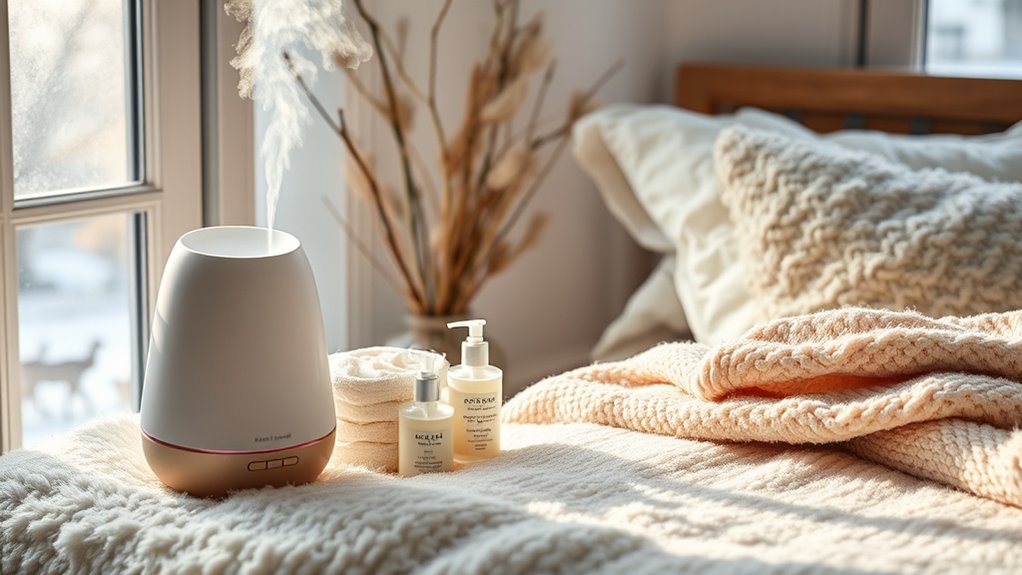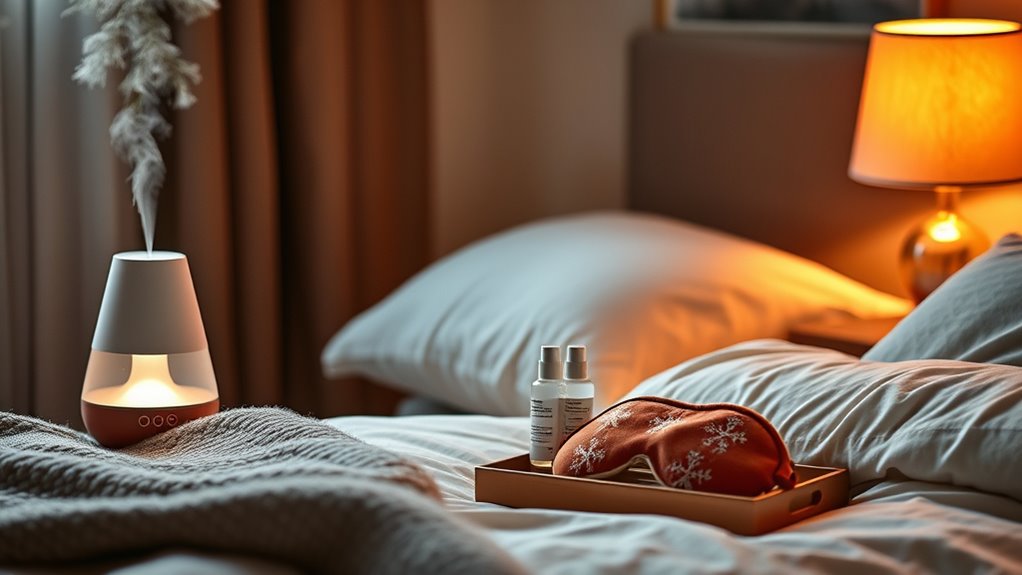To prep for winter wellness, use a humidifier to add moisture and prevent dry, uncomfortable air inside your home. Focus on improving sleep by keeping your bedroom cool, dark, and quiet, and stick to a consistent routine. Protect your skin with hydrating products and gentle cleansers, paying attention to exposed areas like lips and hands. Maintaining good indoor air quality and sleep habits helps boost your immunity and skin health all season long. Keep going to learn more tips just for you.
Key Takeaways
- Use humidifiers to maintain optimal indoor humidity (40-60%) and prevent dry skin and respiratory issues.
- Establish a consistent sleep routine with a cool, dark, and quiet environment for restorative winter sleep.
- Incorporate hydrating skincare products with hyaluronic acid, glycerin, and ceramides to combat winter dryness.
- Ensure proper ventilation and fresh air circulation to reduce indoor pollutants and allergens.
- Protect exposed skin areas like hands and lips with moisturizing products to prevent chapping and irritation.

As winter approaches, it’s essential to prepare your body and home to stay healthy and comfortable through the cold months. One of the key ways to do this is by paying attention to indoor air quality. During winter, homes tend to become stuffy because we keep windows closed to retain heat. This can lead to a buildup of indoor pollutants, allergens, and dry air, which can compromise your respiratory health and overall wellness. To combat this, consider investing in a good humidifier. Humidifiers add moisture to the air, making your indoor environment less dry and more comfortable. Proper humidity levels—ideally between 40% and 60%—help prevent respiratory issues, reduce static electricity, and keep your skin from becoming cracked and irritated. Maintaining good indoor air quality also means regularly changing filters, ventilating your home when possible, and avoiding sources of indoor pollution like smoking or excessive use of harsh cleaning chemicals. Additionally, ensuring your home has adequate ventilation can help reduce indoor pollutants and improve overall air quality.
Alongside improving indoor air quality, seasonal skincare becomes especially vital during winter. Cold air and low humidity strip moisture from your skin, leading to dryness, flakiness, and irritation. To protect your skin, you should adjust your skincare routine by switching to richer, more hydrating products. Incorporate moisturizers that contain ingredients like hyaluronic acid, glycerin, and ceramides, which help lock in moisture. Don’t forget to apply sunscreen daily, even in winter, as UV rays can still cause damage. Additionally, taking shorter, lukewarm showers instead of hot ones helps prevent your skin from becoming overly dry. Use gentle cleansers that won’t strip away natural oils, and always pat your skin dry before applying moisturizer to maximize hydration. Remember, seasonal skincare isn’t just about your face; pay attention to your hands, lips, and other exposed areas that can become chapped and cracked without proper care. Proper skincare routines combined with indoor air quality maintenance help keep your skin healthy all winter long.
You also need to prioritize good sleep, which is essential for your immune system and overall health during winter. A comfortable sleep environment, facilitated by a humidifier, can help you breathe easier and stay asleep longer. Keep your bedroom cool, dark, and quiet, and establish a consistent bedtime routine to signal to your body that it’s time to rest. Proper sleep supports your skin’s natural repair processes and helps you manage seasonal stress. During winter, it’s common to experience mood dips or fatigue, so ensuring quality sleep can make a noticeable difference in your energy levels and mental clarity. Coupling this with good indoor air quality and effective skincare creates a thorough approach to winter wellness. By addressing these areas, you’ll help your body withstand the season’s challenges, stay healthy, and feel your best every day.
Frequently Asked Questions
How Often Should I Replace My Humidifier Filter During Winter?
You should replace your humidifier filter every 1 to 3 months during winter, depending on usage and water quality. Regular humidifier maintenance is key to keeping it running efficiently and ensuring healthy air. Check the filter’s lifespan recommended by the manufacturer, and inspect it frequently for mold or buildup. Replacing the filter as needed helps prevent bacteria growth and maintains ideal humidity levels in your space.
What Are the Best Sleep Positions for Winter Comfort?
You should sleep in a cozy, fetal position or on your side to stay warm and comforted during winter. Your sleep posture helps retain body heat, while winter bedding choices like flannel sheets and layered blankets create a soft, warm cocoon. Imagine curling up under a warm quilt, feeling the gentle pressure of the blankets, as your body relaxes and your mind drifts into restful sleep amid the chilly night.
Which Skincare Ingredients Are Most Effective in Winter?
In winter, you should look for skincare ingredients like moisturizing agents, such as hyaluronic acid and glycerin, to lock in hydration. Antioxidant ingredients like vitamin C and E help protect your skin from environmental damage caused by cold air and pollution. These ingredients work together to keep your skin nourished, plump, and resilient during the harsh winter months. Incorporate them into your routine for healthier, more comfortable winter skin.
Can Humidifiers Help With Winter Allergy Symptoms?
Humidifiers can totally transform your winter allergy experience! By adding moisture to the air, they help soothe irritated nasal passages and reduce allergy symptoms. Just remember, proper humidifier maintenance is essential—clean it regularly to prevent mold and bacteria buildup. For maximum allergy relief, follow allergy relief tips like keeping windows closed and using air purifiers. With these steps, you’ll breathe easier and feel way less miserable this winter!
How Does Cold Weather Affect Skin Barrier Function?
Cold weather weakens your skin barrier by causing skin dehydration, making it more prone to irritation and dryness. When your skin loses moisture, it struggles to repair itself effectively, leading to increased sensitivity. To combat this, you should focus on barrier repair by using moisturizers that lock in hydration and protect against harsh elements. Staying consistent with skincare routines helps maintain your skin’s resilience and preserves its natural barrier during winter months.
Conclusion
Now that you know how to prepare your skin, sleep, and air for winter, the real challenge begins. Will these simple changes truly make a difference as the cold months settle in? Stay tuned—there’s more to discover about revealing your ultimate winter wellness. The secrets you didn’t see coming could be just around the corner. Are you ready to take the next step and truly thrive this winter? The answer might surprise you.









